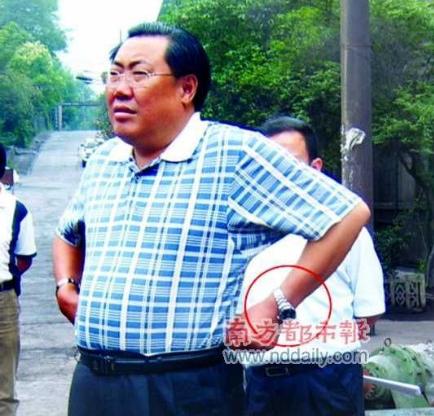Netizens keep an eye on officials
 0 Comment(s)
0 Comment(s) Print
Print E-mail Xinhua, August 31, 2012
E-mail Xinhua, August 31, 2012
Yang Dacai was initially criticized for smiling at the scene of a deadly traffic accident site but the workplace safety official's real trouble came after online critics turned their attention to his wrist.
|
|
|
Yang Dacai |
A photo showing a smiling Yang at the site of a bus-tanker collision that killed 36 in Yan'an in northwest China's Shaanxi Province on Sunday triggered criticism from netizens who said the official should not have smiled at such a sorrowful occasion.
However, the critics' attention soon diverted to Yang's wrist after a netizen spotted a "Vacheron Constantin" watch on him, although he later clarified it was a less pricey "Montblanc."
Several other photo posts showed Yang wearing five different expensive watches, including Rolex and Omega, with an estimated total cost of 200,000 yuan (31,500 U.S. dollars).
Netizens wanted to know where all these watches came from. The salary for a public servant official at his level is about 10,000 yuan pre-tax, and therefore he could barely afford so many luxury watches, they thought.
Yang responded to the crisis in a microblog interview at Sina Weibo on Wednesday, explaining that he was a wristwatch fan and he bought all five watches.
The explanation failed to clear people's doubts but instead led to more exposures. As of Friday, netizens posted more pictures of Yang with six different watches.
An official from the Shaanxi provincial disciplinary body told Xinhua Friday that it has launched an investigation against Yang, about the pricey watches he has been wearing.
Yang is not alone in getting into trouble after being exposed online for improper behavior.
An official in south China's Guangzhou City was heavily criticized by netizens after he was alleged to have beaten a stewardess of a China Southern Airlines flight on Wednesday.
The official, Fang Daguo, has reportedly apologized to the woman, but it is still not clear if he will face disciplinary punishment.
Powerful disciplinary force
China's netizens have formed a powerful force that serves as an invisible disciplinary watchdog as they dig, spot and expose officials' improper speeches, misconducts and suspicious behaviors online.
In 2009, Zhou Jiugeng, a former official in real estate management in Nanjing City in east China, was sentenced to 11 years in jail over bribery following a photo that was released online showed him smoking a 150-yuan-per-pack cigarette. The sentence was a landmark for such cases in China.
As of June, China has 538 million Internet users, accounting for nearly 40 percent of the country's population.
Unlike in real life, where ordinary people are reluctant to accuse government officials because of complicated procedures or lack of evidence, people online tend to expose whatever they consider problematic.
These exposures have provided tips for media and disciplinary authorities to investigate possible corruption or other wrongful behaviors by officials.
Liu Hongyi, deputy secretary of the National School of Administration branch of the Communist Party of China, said the public have always been concerned about bribery cases, and the development of the Internet has given them a better channel to release what they find.
"Easy access to public opinions has served as an additional pair of fists for the government to crack down on corruption cases, leaving corrupt officials nowhere to hide," said Liu.
Under public monitoring, officials have to watch themselves. "Like living in a fish tank, he or she is being watched all the time," he said.
A county-level official in east China's Anhui Province said, on condition of anonymity, that the powerful Internet supervision left him feeling "insecure."
"I have to be careful with my every move and every word for fear of drawing public criticism online," said the official.
Follow-up efforts needed
Ordinary people are free to release any information online, whether it is factual or not, and therefore, rumors are inevitable.
"Untrue information is misleading, and will have a very negative social impact," Liu said.
He advised government authorities to take proactive efforts investigating, verifying online information and having the public informed as soon as possible to ensure sound credibility. "The government should demonstrate a positive resolution when handling these cases," he said.
Tang Yuanqing, a professor on communication and public opinion from the Communication University of China, said microblogs have formed a "micro-power", which becomes collectively huge.
He also warned although the power helped supervise government officials, it could also be a hotbed for rumors.
Apart from government actions, Tang said traditional media was also obliged to investigate tips exposed online.







Go to Forum >>0 Comment(s)